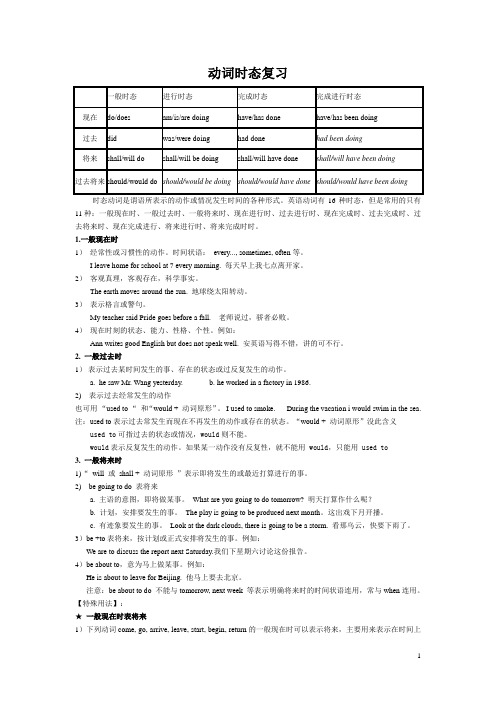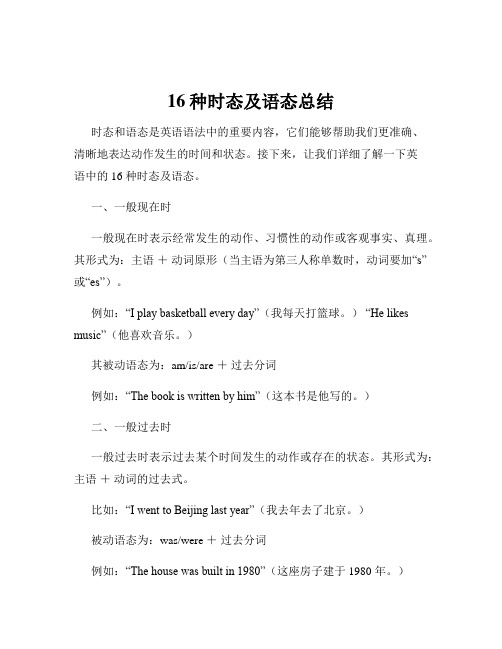11种时态
11种时态

十一种时态和例子(1)一般现在时、1) They go to work by bike every day.他们每天都骑自行车去工作。
2) Does the moon move around the sun? Yes, it does.月亮总是围绕着太阳转吗?是的,月亮总是围绕着太阳转3) He doesn't love sports.他不喜欢娱乐/运动4) We are all teachers from the country.我们所有是老师都是来自乡村的5) The children don’t have enough food in Africa.在非洲孩子是没有足够的食物的6) Do you go to see your uncle every other day?你是每隔一天就去看你的叔叔吗?(2)现在进行时1)They are showing us around the farm.他们2)Are the students reading now?3)It isn't raining hard.4)We are leaving on Friday.(3)现在完成时1)How many words have you learnt today?2)He hasn't got up yet.3)I have been to England.(4)现在完成进行时1)I've been sitting here all day.2)Has it been raining for three days? Yes, it has. 3)We have not just been talking about you. (5)一般过去时1)My mother wasn't in last night.2)We didn't watch TV last night.3)The girl cried just now.4)We were middle school students last year.5)Were you at home last night? Yes, I were.6)Did you wash clothes last night? No, I didn't. (6)过去进行时1)I was reading at night yesterday morning.2)We weren't planting trees this time yesterday.3)Were they singing when the teacher came? Yes, they were.(7)过去完成时1)He said he hadn't collected 300 stamps.2)Had you learnt 280 new words by the end of last month ?3)When I rushed to the cinema, the film had begun. (8)过去将来时1)He said his mother would buy a bike for him2)My brother told me he wouldn’t believe Jack any more.3)Would it be all right if he knew his illness?(9)一般将来时1)When will you be able to visit us again?2)I won't be free tonight.3)My sister will finish her middle school this year. (10)将来完成时1)We will have finished our middle school next July.2)Will he have finished writing the novel by the end of next month? Yes, he will.3)We won't have finished the job when you turn back.(11)将来进行时1)What will they be doing tomorrow evening?2)It won't be long before we will be making such a good train.3)I won't be leaving until 12.。
英语中的16种时态

英语中的16种时态英语时态分为16种,下面就为大家一一列举:1、一般现在时态:表示现在的状态,或者经常反复发生的动作或习惯。
例如:I am a student.我是一名学生。
2、现在进行时态:表示正在进行的动作或存在的状态。
例如:He is studying.他在学习。
3、现在完成时态:表示过去发生的动作对现在造成的影响或结果。
例如:I have finished my homework.我已经完成了我的作业。
4、现在完成进行时态:表示从过去开始一直持续到现在的动作或状态。
例如:We have been waiting for you for hours.我们已经等了你几个小时了。
5、过去一般时态:表示过去某个时间点的状态或动作。
例如:He wasa teacher.他是一名老师。
6、过去进行时态:表示过去某个时间点正在进行的动作或存在的状态。
例如:They were playing football at that time.他们在那个时候正在踢足球。
7、过去完成时态:表示过去的过去,即过去某一时间之前发生的动作或状态。
例如:They had finished their work before we arrived.在我们到达之前,他们已经完成了他们的工作。
8、过去完成进行时态:表示过去某一时间之前一直在进行的动作或状态。
例如:We had been waiting for the bus for hours before it finally arrived.在公共汽车最终到达之前,我们已经等了好几个小时。
9、将来一般时态:表示将来某个时间点的状态或动作。
例如:She will be a doctor.她将成为一名医生。
10、将来进行时态:表示将来某个时间点正在进行的动作或存在的状态。
例如:We will be studying in the library tomorrow afternoon.我们明天下午将在图书馆学习。
高中英语时态总复习

动词时态复习一般时态进行时态完成时态完成进行时态现在do/does am/is/are doing have/has done have/has been doing过去did was/were doing had done had been doing将来shall/will do shall/will be doing shall/will have done shall/will have been doing过去将来 should/would do should/would be doing should/would have done should/would have been doing时态动词是谓语所表示的动作或情况发生时间的各种形式。
英语动词有16种时态,但是常用的只有11种:一般现在时、一般过去时、一般将来时、现在进行时、过去进行时、现在完成时、过去完成时、过去将来时、现在完成进行、将来进行时、将来完成时时。
1.一般现在时1)经常性或习惯性的动作。
时间状语:every..., sometimes, often等。
I leave home for school at 7 every morning. 每天早上我七点离开家。
2)客观真理,客观存在,科学事实。
The earth moves around the sun. 地球绕太阳转动。
3)表示格言或警句。
My teacher said Pride goes before a fall.老师说过,骄者必败。
4)现在时刻的状态、能力、性格、个性。
例如:Ann writes good English but does not speak well. 安英语写得不错,讲的可不行。
2. 一般过去时1)表示过去某时间发生的事、存在的状态或过反复发生的动作。
a. he saw Mr. Wang yesterday.b. he worked in a factory in 1986.2) 表示过去经常发生的动作也可用“used to “和“would + 动词原形”。
16种时态及语态总结

16种时态及语态总结时态和语态是英语语法中的重要内容,它们能够帮助我们更准确、清晰地表达动作发生的时间和状态。
接下来,让我们详细了解一下英语中的 16 种时态及语态。
一、一般现在时一般现在时表示经常发生的动作、习惯性的动作或客观事实、真理。
其形式为:主语+动词原形(当主语为第三人称单数时,动词要加“s”或“es”)。
例如:“I play basketball every day”(我每天打篮球。
)“He likes music”(他喜欢音乐。
)其被动语态为:am/is/are +过去分词例如:“The book is written by him”(这本书是他写的。
)二、一般过去时一般过去时表示过去某个时间发生的动作或存在的状态。
其形式为:主语+动词的过去式。
比如:“I went to Beijing last year”(我去年去了北京。
)被动语态为:was/were +过去分词例如:“The house was built in 1980”(这座房子建于 1980 年。
)三、一般将来时一般将来时表示将来要发生的动作或存在的状态。
常见形式有:will +动词原形;be going to +动词原形。
例如:“I will visit my grandparents next week”(下周我将看望我的祖父母。
)“She is going to have a party”(她打算举办一个聚会。
)其被动语态为:will be +过去分词;be going to be +过去分词例如:“The meeting will be held tomorrow”(会议将在明天举行。
)“The sports meeting is going to be cancelled”(运动会将要被取消。
)四、过去将来时过去将来时表示从过去的某一时间来看将来要发生的动作或存在的状态。
其形式为:would +动词原形;was/were going to +动词原形。
英语的十一种时态与例句

英语的十一种时态与例子(1)一般现在时,1) They go to work by bike every day. ,2) Does the moon move around the sun? Yes, it does. ,3) He doesn't love sports. ,4) We are all teachers from the country. ,5) The children don’t have enough food in Africa. ,6) Do you go to see your uncle every other day? ,(2)现在进行时,1)They are showing us around the farm. ,2)Are the students reading now?,3)It isn't raining hard. ,4)We are leaving on Friday. ,(3)现在完成时,1)How many words have you learnt today? ,2)He hasn't got up yet. ,3)I have been to England. ,(4)现在完成进行时,1)I've been sitting here all day. ,2)Has it been raining for three days? Yes, it has. ,3)We have not just been talking about you. ,(5)一般过去时,1)My mother wasn't in last night. ,2)We didn't watch TV last night. ,3)The girl cried just now. ,4)We were middle school students last year. ,5)Were you at home last night? Yes, I were. ,6)Did you wash clothes last night? No, I didn't. ,(6)过去进行时,1)I was reading at night yesterday morning. ,2)We weren't planting trees this time yesterday. ,3)Were they singing when the teacher came? Yes, they were. ,(7)过去完成时,1)He said he hadn't collected 300 stamps. ,2)Had you learnt 280 new words by the end of last month ? ,3)When I rushed to the cinema, the film had begun. ,(8)过去将来时,1)He said his mother would buy a bike for him ,2)My brother told me he wouldn’t believe Jack any more. ,3)Would it be all right if he knew his illness? ,(9)一般将来时,1)When will you be able to visit us again? ,2)I won't be free tonight. ,3)My sister will finish her middle school this year. ,(10)将来完成时,1)We will have finished our middle school next July. ,2)Will he have finished writing the novel by the end of next month? Yes, he will. ,3)We won't have finished the job when you turn back. ,(11)将来进行时,1)What will they be doing tomorrow evening? ,2)It won't be long before we will be making such a good train. ,3)I won't be leaving until 12. 网络。
英语语法十六种时态

英语语法中有16种时态,它们是:
1. 一般现在时(Simple Present)
2. 现在进行时(Present Continuous)
3. 现在完成时(Present Perfect)
4. 现在完成进行时(Present Perfect Continuous)
5. 一般过去时(Simple Past)
6. 过去进行时(Past Continuous)
7. 过去完成时(Past Perfect)
8. 过去完成进行时(Past Perfect Continuous)
9. 一般将来时(Simple Future)
10. 将来进行时(Future Continuous)
11. 将来完成时(Future Perfect)
12. 将来完成进行时(Future Perfect Continuous)
13. 一般过去将来时(Future in the Past)
14. 过去将来进行时(Future Continuous in the Past)
15. 过去将来完成时(Future Perfect in the Past)
16. 过去将来完成进行时(Future Perfect Continuous in the Past)
这些时态用于表达不同的时间和状态,帮助我们准确地描述事件的发生和顺序。
请注意,每个时态都有其特定的构成和用法。
11种常用时态用法一览表

8.过去将来时
would do
在过去某一时刻看来将要发生的动作或存在的状态
John promised his doctor he wouldn’t smoke, and he has not smoked ever since.
Ihave just received a letter from my brother, Tim.
My brother has never been abroad before.
4.现在完成进行时
has / have + been doing
1与表示一段时间的时间状语连用时,表示一个动作从过去某时开始,延续到说话时刻,并有可能延续下去(此用法可与现在完成时互换使用,但更强调动作的持续性、暂时性和未完成性)
2表示说话时正在进行的动作
3表示已经确定或安排好的将来活动(go, start, come, leave, start, begin )
now, at the moment, just
The workers are building a new bridge across the river.
I’m leaving for a trek inNepalnext week.
I'll tell her when she comes tomorrow.
According to the timetable, the express train toShanghaistarts at nine in the morning.
2.现在进行时
is/ am/ are doing
英语时态语法

英语时态语法英语时态是指动词所表示的动作或状态发生的时间。
英语中有多种时态,包括以下几种主要时态:1. 现在时态(Present Tense):- 简单现在时(Simple Present Tense):用于表示经常性的、习惯性的行为或客观事实。
- 现在进行时(Present Continuous Tense):用于表示正在进行的动作或现阶段正在发生的事情。
2. 过去时态(Past Tense):- 简单过去时(Simple Past Tense):用于表示过去发生的动作或状态。
- 过去进行时(Past Continuous Tense):用于表示过去某个时间正在进行的动作。
3. 将来时态(Future Tense):- 简单将来时(Simple Future Tense):用于表示将来要发生的动作或打算。
- 将来进行时(Future Continuous Tense):用于表示将来某个时间正在进行的动作。
4. 完成时态(Perfect Tense):- 现在完成时(Present Perfect Tense):用于表示过去某个时间点开始的动作,一直持续到现在或与现在有关的动作。
- 过去完成时(Past Perfect Tense):用于表示过去某个时间点之前完成的动作。
- 将来完成时(Future Perfect Tense):用于表示将来某个时间点之前已经完成的动作。
5. 完成进行时态(Perfect Continuous Tense):- 现在完成进行时(Present Perfect Continuous Tense):用于表示过去某个时间点开始的动作一直持续到现在,并可能继续进行。
- 过去完成进行时(Past Perfect Continuous Tense):用于表示过去某个时间点之前一直在进行的动作。
注意:英语中的时态非常灵活,可以通过上下文来判断时态的使用。
同时,某些情况下,时态之间可以互相转换,例如,简单现在时可以用来表示将来计划的动作,而现在进行时可以用来表示近未来安排的计划。
- 1、下载文档前请自行甄别文档内容的完整性,平台不提供额外的编辑、内容补充、找答案等附加服务。
- 2、"仅部分预览"的文档,不可在线预览部分如存在完整性等问题,可反馈申请退款(可完整预览的文档不适用该条件!)。
- 3、如文档侵犯您的权益,请联系客服反馈,我们会尽快为您处理(人工客服工作时间:9:00-18:30)。
(2)在make sure, make certain, see (to it) 后的 that从句中,谓语动词用一般现在时代替 将来时。 See to it that you include in the paper whatever questions they didn’t know the answer to last time.
主语+ 宾语+ 主语+would X + 宾语+其它 主语+ 主语+would not X+宾语+其它 +宾语+ Would +主语+X+宾语+其它? 主语+ +宾语+其它?
主语+had Xed+宾语 主语 宾语 主语+had not Xed +… 主语 Had+主语 主语+Xed+…..? 主语
主语 + shall/will be Xing + 宾语 主语 + shall/will not be Xing + 宾语 Shall/Will + 主语 + be Xing + 宾语 ?
• • • • • • • •
你知道怎么去火车站吗? 一般现在时 知道怎么去火车站吗? 怎么去火车站吗 会议结束了吗? 结束了吗 会议结束了吗? 现在完成时 一般过去时 告诉我那天他正在 作业。 我那天他正在写 他告诉我那天他正在写作业。过去进行时 去年底之前,小王写 本书 过去完成时 本书。 去年底之前,小王写了3本书。 昨天下午4点 你在干什么? 昨天下午 点,你在干什么? 过去进行时 一般过去时 进来时会议早就结束了 时会议早就结束 他进来时会议早就结束了。过去进行时 现在完成时 我三天没有合眼 合眼了 极了。 我三天没有合眼了,累极了。 一般现在时 周总理为人民做出了很大的贡献。 做出了很大的贡献 周总理为人民做出了很大的贡献。
3.完成进行时指动作在完成时的基础上还 要继续下去。如: • The company has been promising a rise in salary for ages, but nothing has happened.
•
一般现在时、 一般现在时、现在将来完成时 一般过去时、 一般过去时、现在完成进行时
新学期开始以来,小王一直努力学习。 新学期开始以来,小王一直努力学习。 开始以来 学习 这些年来年一直住在哪里? 这些年来年一直住在哪里? 现在完成进行时 现在将来完成时 点种我将做 到10点种我将做完家庭作业。 点种我将 完家庭作业。 你明天9点 车站时,你叔叔将在那里等 你明天 点到车站时,你叔叔将在那里等你。
(2)by +将来时间、by the time/ when +谓语 动词是一般现在时的从句,主句用将来完 成时。如: • By the time you arrive in London, we will have stayed in Europe for two weeks. • I hope her health will have improved greatly by the time we come back next year.
一般过去时
Hale Waihona Puke 现在完成时• 你到哪里去了?我到处找你! 一般过去时 你到哪里去 我到处找 一般过去时 • 我以前是个老百姓,现在是个军人。 我以前是个老百姓,现在是个军人。 一般现在时 • 在爬到山上前, 到山上前, 一般过去时 • • • • •
我们克服了很多困难。 我们克服了很多困难。 过去完成时 克服了很多困难 一般过去时 你没有交作业,老师要批评 批评你 你没有交作业,老师要批评你!现在将来时 他已经入党了。 他已经入党了。 现在完成时 一般现在时 做完作业后,你干什么? 现在将来时 一般现在时 完作业后, 什么? 天气这么热 天气这么热,他来吗? 现在将来时 一般过去时 老师说地球围绕太阳转 老师说地球围绕太阳转。一般现在时
主语 + shall/will have Xed + 宾语 主语 + shall/will not have Xed +… Shall/Will+ 主语 + have Xed + 宾语 宾语?
主语 + have/has been Xing + 宾语 主语 + have/has not been Xing + 宾语 Have/Has + 主语 + been Xing + 宾语 ?
3000 years 3 hours 3 hours
过过
过去
现在
将来
专业四级中考察时态的内容
1.表达将来时的形式: (1)在时间、条件、让步从句中,一般现在 时代替将来时,但宾语从句例外,如: • I’ll tell him when you will ring again. • 比较: • I’ll tell him when you ring again.
主语+ 宾语+ 主语+shall/will X + 宾语+其它 主语+ 主语+shall/will not X+宾语+其它 +宾语+ Shall/Will +主语+X+宾语+其它? 主语+ +宾语+其它? 主语+ 主语+Xed+宾语+其它 +宾语+ 主语+ 宾语+ 主语+did not X +宾语+其它 Did +主语+X+宾语+其它? 主语+ +宾语+其它?
(4)在It is the +序数词/形容词最高级+that的 定语从句中,谓语动词常用现在完成时。 如: • It isn’t the first time that I have found myself in an embarrassing situation. (5)在no sooner…than…, hardly/scarcely…when…句型中,主句常 用过去完成时。
+ 宾语+其它 主语 单数) X(S) +宾语 其它 (单数) ) 宾语 主语+ 宾语+其它 主语 do(es) not X+宾语 其它 宾语 Do (es) +主语 主语+X+宾语 其它? 宾语+其它 主语 宾语 其它?
主语+be+Xing+宾语+其它 +宾语+ 主语 主语+ 宾语+ 主语+be not Xing +宾语+其它 Be +主语+Xing+宾语+其它? 主语+ +宾语+其它?
主语+have/has Xed+宾语 主语 宾语 主语+have/has not Xed +… 主语 Have/has+主语 主语+Xed+…..? 主语
主语+was/were +Xing+宾语+其它 主语 +宾语+ 主语+ 宾语+ 主语+was/were not Xing +宾语+ Was/Were +主语+Xing+宾语? 主语+ +宾语?
主语+谓语 宾语 主语 谓语+宾语 其它成分 谓语 宾语+其它成分
动词 时态
32种变化 种变化 时间的状态
(最常见的有11种变化)
我每天6 起床。 1) 我每天6点起床。 他正在学习英语。 学习英语 2) 他正在学习英语。 小王明天去北京。 3) 小王明天去北京。 4) 他工作已经三个小时。 工作已经三个小时。 已经三个小时 1936年 5) 他1936年入党。 昨天晚上6点我们正在学英语。 6) 昨天晚上6点我们正在学英语。 他们要去北京。 7) 他说他们要去北京。 他已经工作了三个小时了。 工作了三个小时了 8) 他说他已经工作了三个小时了。 明天上午8 00我们就 北京了。 我们就到 9) 明天上午8:00我们就到北京了。 10)中国人 纸已经3000年了。 中国人造 3000年了 10)中国人造纸已经3000年了。 11)你上飞机后 空姐正在迎候 你上飞机后, 迎候你 11)你上飞机后,空姐正在迎候你。
2.完成时是时态测试的重点,注意与完成 时连用的句型和时间状语: (1)by/between/up to/till +过去时间、since、 by the time/when +表示过去发生情况的从 句,主句用过去完成时。 如:We had just had our breakfast when an old man came to the door. • Between 1897 and 1919 at least 29 motion pictures in which artificial beings were portrayed had been produced. • (表示1919年时已发生的情况)
一般过去时
• • • • • • • • •
我进门时,他在打电话。 过去进行时 门时,他在打电话。 一般现在时 听!他来了! 现在进行时 现在将来进行时 抽烟有害健康! 有害健康 抽烟有害健康! 一般现在时 警察检查了你的行李没有? 检查了你的行李没有 警察检查了你的行李没有 现在完成时 到达那个村子前 我们要走一段很长的路。 那个村子前, 到达那个村子前,我们要走一段很长的路。
(3)by now、since +过去时间、 in/during/for/over/the past/last few (或具体 数字) years/days/months,主句用现在完 成时, 但在it is +具体时间since/before这一 句型中,主句更多的时候不用完成时。如: • The changes that had taken place in air travel during the last sixty years would have seemed completely impossible to even the most brilliant scientists at the turn of the 19th century. • It is four years since John left school.
